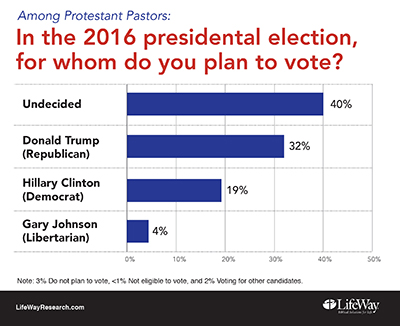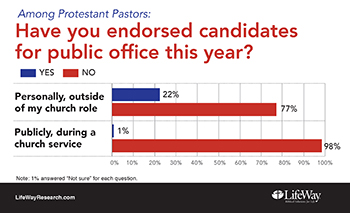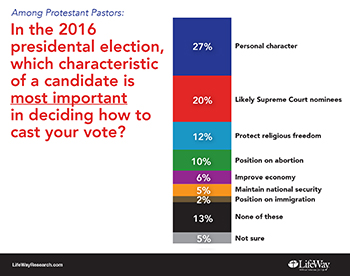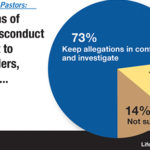NASHVILLE (BP)—Political endorsements by preachers appear to have been few and far between this election season—perhaps because the most popular candidate among preachers is “I don’t know,” a recent study shows.
 A report from LifeWay Research found four out of 10 Protestant pastors are undecided about their presidential vote. A third (32 percent) plan to vote for Donald Trump. One in five (19 percent) plans to vote for Hillary Clinton. Four percent support Gary Johnson. Three percent do not plan to vote.
A report from LifeWay Research found four out of 10 Protestant pastors are undecided about their presidential vote. A third (32 percent) plan to vote for Donald Trump. One in five (19 percent) plans to vote for Hillary Clinton. Four percent support Gary Johnson. Three percent do not plan to vote.
Researchers surveyed 1,000 Protestant senior pastors Aug. 22-Sept. 16, before the presidential debates. This was prior to the emergence of an 11-year-old video in which Trump described women in vulgar terms and talked about groping them.
Most pastors are ambivalent about the major party candidates, said Scott McConnell, executive director of LifeWay Research.
“Donald Trump does better with pastors than Hillary Clinton,” he said. “But both candidates are still less popular than ‘Undecided.’”
Christians vote but necessarily not the same way
Researchers found wide support for voting among Protestant pastors. Eighty-eight percent of pastors say American Christians have a biblical responsibility to vote. That includes pastors of all denominational stripes—from Pentecostal (98 percent) and Baptist pastors (95 percent) to Presbyterian/Reformed pastors (81 percent) and Church of Christ ministers (79 percent).
But pastors don’t expect all Christians to vote the same way, and few believe Christians should support only candidates who can win. Two-thirds (65 percent) disagree with the statement, “Christians who truly vote their conscience will vote for the same candidate.” Less than a third (29 percent) agree. Six percent are not sure.
Two-thirds also disagree with the statement, “American Christians should vote for a candidate who has a reasonable chance of winning.” Twenty-nine percent agree, and 6 percent are not sure.
 While they believe voting is important, Protestant pastors have been extremely reluctant to make political endorsements during church services. Ninety-eight percent of pastors surveyed have not endorsed a candidate during a church service this year. One percent have endorsed a candidate during a service, and 1 percent are not sure.
While they believe voting is important, Protestant pastors have been extremely reluctant to make political endorsements during church services. Ninety-eight percent of pastors surveyed have not endorsed a candidate during a church service this year. One percent have endorsed a candidate during a service, and 1 percent are not sure.
Endorsements outside church are more common. Twenty-two percent of Protestant pastors have endorsed a candidate outside their church role. Seventy-seven percent have not. One percent are not sure.
A similar survey in 2012 found 10 percent of Protestant pastors agreed when asked whether pastors should endorse a candidate from the pulpit. Eighty-seven percent disagreed. In 2012, 44 percent agreed they had endorsed candidates outside of their church role. Fifty-two percent disagreed.
“Enthusiasm for endorsements appears to be waning this year,” McConnell said.
 What matters most?
What matters most?
Researchers found no consensus among pastors about which characteristic matters most when choosing a candidate. Twenty-seven percent say personal character matters most. Twenty percent are most concerned about a candidate’s likely Supreme Court nominees. Twelve percent say the ability to protect religious freedom is most important. Ten percent point to the candidate’s position on abortion. Among other factors: the ability to improve the economy (6 percent), ability to maintain national security (5 percent) and a candidate’s position on immigration (2 percent).
Pastors voting for Trump are more likely to cite Supreme Court nominees (36 percent) and abortion (17 percent) and less likely to say personal character matters most (10 percent). Pastors voting for Clinton are more likely to cite personal character (28 percent) and immigration (7 percent) and less likely to cite abortion (less than 1 percent).
Baptist pastors care most about potential Supreme Court nominees (28 percent). Presbyterian/Reformed (36 percent), Methodist (34 percent) and Holiness pastors (34 percent) favor personal character, and Pentecostal pastors (30 percent) care most about religious freedom.
Demographics and denominations divide pastors when it comes to the 2016 election:
- African-American pastors (37 percent) are most likely to vote for Clinton. Six percent plan to vote for Trump and 54 percent are undecided.
- White pastors (35 percent) favor Trump, while 18 percent favor Clinton and 41 percent are undecided.
- Methodist (44 percent) and Presbyterian/Reformed pastors (50 percent) are more likely to support Clinton.
- Baptist (46 percent) and Pentecostal pastors (61 percent), along with Church of Christ ministers (50 percent), are more likely to favor Trump.
- Pastors voting for Trump are the most likely to say Christians should vote for a candidate who can win (43 percent).
- Evangelical pastors (36 percent) are more likely than mainline pastors (16 percent) to say Christians who vote their conscience will support the same candidate.
- • Democratic pastors (78 percent) are most likely to vote for Clinton, and Republican pastors (53 percent) are most likely to vote for Trump.
- • Pastors who are still undecided include independents (52 percent), those age 18-44 (52 percent), and evangelicals (45 percent).
Clergy and other church leaders may share a common faith, McConnell said. That doesn’t mean they all agree on who should lead the country.
“When it comes to politics, pastors are just as divided as other Americans,” McConnell said.
Researchers used a stratified random sample calling list, drawn from a list of all Protestant churches and used quotas for church size. Each interview was conducted with the senior pastor, minister or priest of the church called.
Analysts weighted responses by region to reflect the population more accurately. The completed sample is 1,000 surveys, providing 95 percent confidence the sampling error does not exceed plus or minus 3.2 percent. Margins of error are higher in subgroups. Subgroups for voting intentions are limited to likely voters.















We seek to connect God’s story and God’s people around the world. To learn more about God’s story, click here.
Send comments and feedback to Eric Black, our editor. For comments to be published, please specify “letter to the editor.” Maximum length for publication is 300 words.